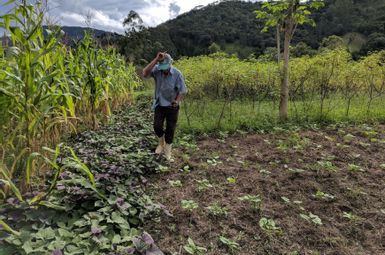
A new study published online April 4 in the journal Science finds that agricultural diversification comes with significant benefits, and very few negative effects.

Despite producing an unprecedented quantity of food worldwide, industrial agricultural systems also exacerbate biodiversity loss, soil and water degradation, and climate change. University of Michigan experts are examining the nexus between modern food systems and greenhouse gas emissions, and identifying more sustainable production approaches based on agroecology. Key to this work are researchers at the Sustainable Food Systems Initiative and the Center for Sustainable Systems who are advancing the scientific basis for sustainable and resilient food systems.

A new study published online April 4 in the journal Science finds that agricultural diversification comes with significant benefits, and very few negative effects.
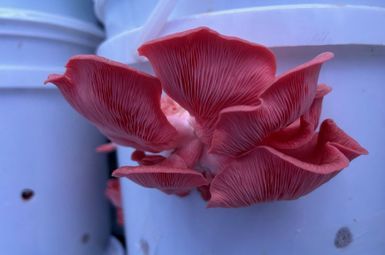
Mushrooms come with a seemingly endless list of things that make them unique, including some that glow in the dark, some that are poisonous, and others that have been living for thousands of years. In the natural world, they are known as efficient decomposers and fast growers that play an integral role in maintaining and restoring the ecosystem.
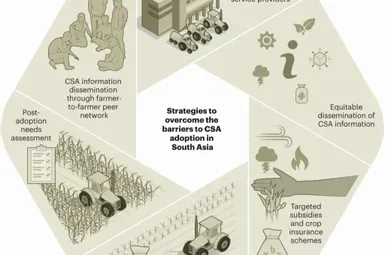
Despite the possibility of climate-smart agriculture improving food security, most CSA practices and technologies are not widely adopted in South Asia.
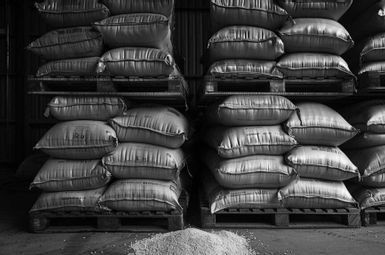
Rice exported to Haiti—mostly from the United States—contains unhealthy levels of arsenic and cadmium, which can increase the risk of various cancers, heart disease, diabetes and other illnesses, new research shows.
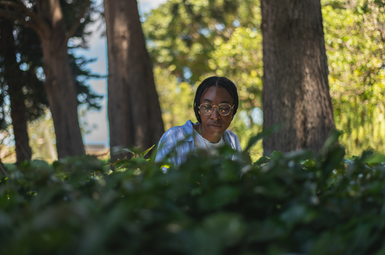
Alexa White studies sustainable agriculture in connection with a broader focus on environmental justice. What sustainable agriculture means to people from different parts of the world—and from different socioeconomic strata—is the focus of her dissertation work as a Ph.D. candidate in ecology and evolutionary biology. What environmental justice means to her is, “the right and autonomy for individuals to have access to fresh food, water, and basic human resources without being disenfranchised or oppressed.”
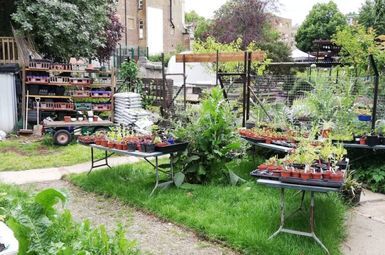
A new U-M-led international study finds that fruits and vegetables grown in urban farms and gardens have a carbon footprint that is, on average, six times greater than conventionally grown produce.
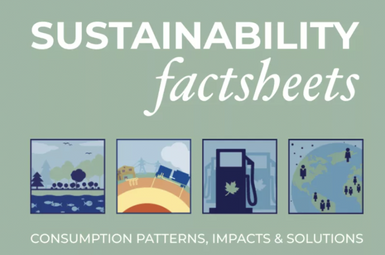
Each peer-reviewed factsheet presents data on patterns of use, life cycle impacts, and sustainable solutions. Updated annually by a current SEAS graduate student, the collection is a free resource to inform journalists, policymakers, business professionals, students, teachers and the public.
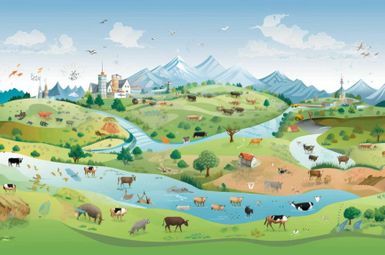
Agriculture can both help and hinder: It can act as an incubator of novel animal-borne microbes, facilitating their evolution into human-ready pathogens, or it can form barriers that help block their spread.
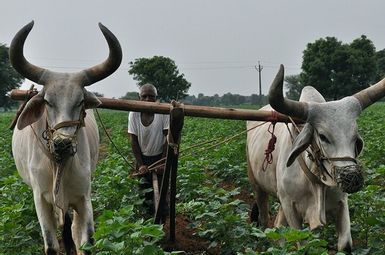
A new University of Michigan-led study finds that farmers in India have adapted to warming temperatures by intensifying the withdrawal of groundwater used for irrigation. If the trend continues, the rate of groundwater loss could triple by 2080, further threatening India’s food and water security.
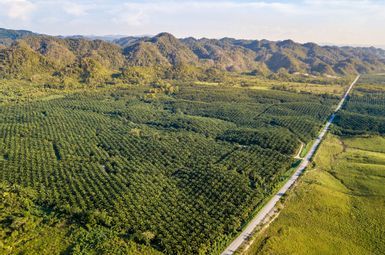
Producing palm oil has caused deforestation and biodiversity loss across Southeast Asia and elsewhere, including Central America. Efforts to curtail the damage have largely focused on voluntary environmental certification programs that label qualifying palm-oil sources as “sustainable.”

“I just thought it was an interesting story that this red alga looks so much like an animal, namely, a coral. It had been unnoticed as such, and then it turned out to have some distinctive features.”
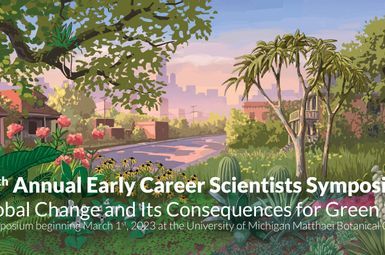
This year’s theme was “Global Change and Its Consequences for Green Life,” and focused on the Direct and indirect impacts of environmental change on green life survival, reproduction, and distribution, how green life can buffer the impact of global change, evolutionary responses of green life to environmental change/stress, green life functional traits and their environmental correlates, and agroecology.
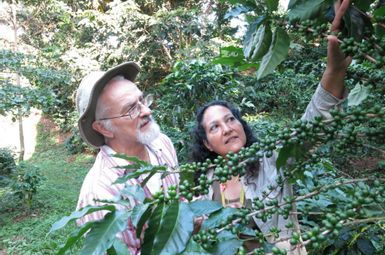
U-M ecologists Ivette Perfecto and John Vandermeer examine competition among the ant community at a Puerto Rican coffee farm and the maintenance of species diversity there.
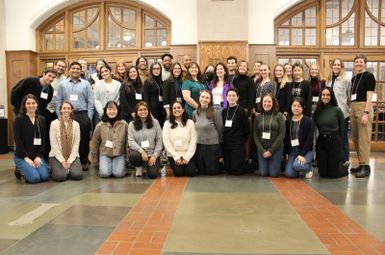
The Dow Sustainability Fellows Program, administered by the Graham Sustainability Institute, will award over $800,000 in tuition and project funding in 2023. The funds will support more than 40 outstanding graduate students from ten University of Michigan (U-M) schools, colleges, and units, including two large student projects funded by Dow Distinguished Awards.
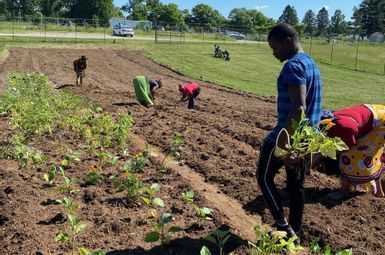
Grown from an idea cultivated by U-M student Phimmasone Kym Owens, a collaboration between Jewish Family Services of Washtenaw County (JFS) and Matthaei Botanical Gardens and Nichols Arboretum (MBGNA) has given rise to an area that has been dubbed by its users as “The Freedom Garden” – a space where refugee clients can grow their own food through community gardening.

"There has been a lot of working trying to understand the role of urban gardens and farms in cities. And the general conclusion is that it can provide a lot of social, economic and environmental benefits. Urban agriculture is this sort of unique land use that is extremely customizable to the needs of the community. "
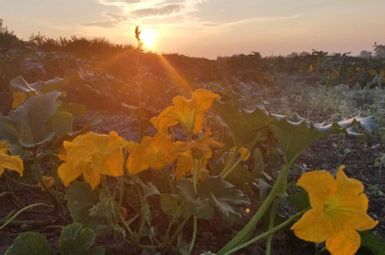
Efforts to promote the future health of both wild bees and managed honeybee colonies need to consider specific habitat needs, such as the density of wildflowers. At the same time, improving other habitat measures—such as the amount of natural habitat surrounding croplands—may increase bee diversity while having mixed effects on overall bee health.
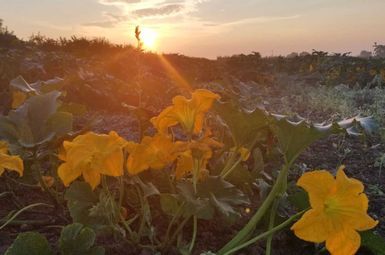
Efforts to promote the future health of both wild bees and managed honeybee colonies need to consider specific habitat needs, such as the density of wildflowers. At the same time, improving other habitat measures—such as the amount of natural habitat surrounding croplands—may increase bee diversity while having mixed effects on overall bee health.
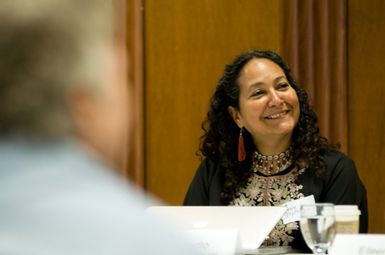
U-M Professor Ivette Perfecto recently highlighted the intersection of biodiversity conservation with agriculture on coffee farms. She stated that “about 40% of the Earth’s terrestrial surface is an agricultural system.” While many people may think that agriculture is always harmful to biodiversity, Perfecto says that many agricultural systems, such as the coffee agroforestry systems, can be diverse and “contribute significantly to the conservation of biodiversity.”

Fish excretions. Yes, that’s fish pee. Could it improve food security in the Caribbean? Allgeier thinks so, and it might even help slow global warming.

Trish Fisher's (MPP/MPH ‘23) work examines agricultural methane governance in the U.S. and Canada—two of the world’s largest producers, consumers, and exporters of livestock and animal source food products. “Recent research has demonstrated that even if global combustion of fossil fuels were to cease immediately, emissions from the global food system alone would exceed 1.5 degrees Celsius of warming and threaten the preclusion of 2 degrees Celsius of warming by 2100,” she said.

In support of ongoing sustainability efforts across U-M, this year the Excellence in Sustainability Honors Cord Program offers special graduation cords for those who have excelled in areas of sustainability. “Most of the fibers in the world have polyester or nylon in them which are fossil fuel-derived materials. We really wanted to steer clear of anything that had any sort of deep fossil fuel footprint or was manufactured overseas," said Stamps School of Art & Design professor Joseph Trumpey.
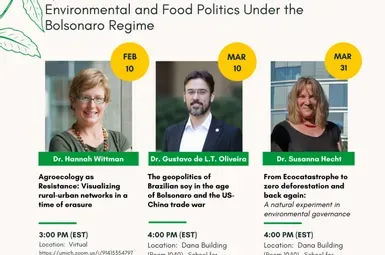
When Jair Bolsonaro, a right-wing populist, was elected as Brazil’s president in 2018, people began wondering about the consequences of that election for the environment, food systems, and trade, among many other social and ecological issues.
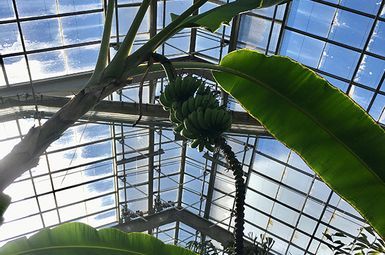
Winter visits to the conservatory at Matthaei Botanical Gardens are a treat for the senses: warm temperatures, lush greenery, and plants in bloom or in fruit. A visitor favorite is one of the banana tree plants, which just finished a fruiting cycle. Despite its height, it’s not a true tree after all.
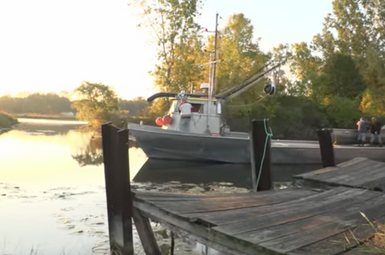
For Frank Turchan, executive chef at M Dining, using local produce is a way to support sustainability, but it’s also just good food. Turchan works with a number of farmers and producers both locally and from across the state. These include more than 20 companies that sell food products, such as Zingerman’s; Prairie Farms, a Midwest dairy cooperative; and Detroit’s Better Made Chips, McClure Pickle, Quality Meats & Culinary Specialties and LaGrasso Brothers, which grows lettuce and sources produce from other local farmers.
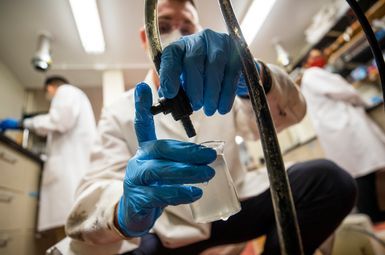
Cattle are supremely efficient at digesting tough materials, and a proposed energy-production system based, in part, on cow stomachs could generate 40% more power from municipal waste streams, at a 20% reduced cost—and provide a viable alternative to sending waste to landfills.
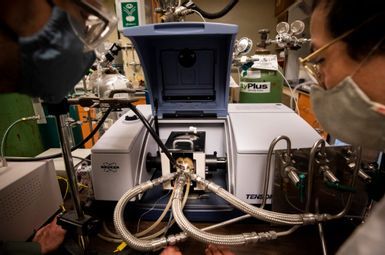
Producing the fertilizer that helps feed Earth’s 7.8 billion people comes with an environmental cost—one that U-M engineers are hoping to lessen with a new strategy that favors sunlight over fossil fuels. The National Science Foundation has awarded U-M researchers $2 million to study the effectiveness of a new ammonia production process aimed at reducing greenhouse gas emissions.
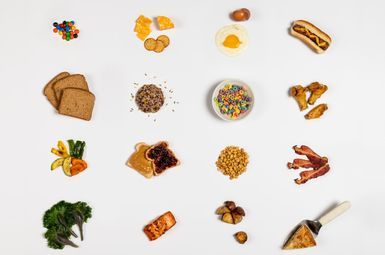
A U-M study evaluated more than 5,800 foods, ranking them by their nutritional disease burden to humans and their impact on the environment. It found that substituting 10% of daily caloric intake from beef and processed meats for a mix of fruits, vegetables, nuts, legumes and select seafood could reduce your dietary carbon footprint by one-third and allow people to gain 48 minutes of healthy minutes per day.

What is the carbon footprint for all of the food the University of Michigan consumes? And how can that footprint be reduced? That was one of the many study areas the President’s Commission on Carbon Neutrality addressed in its final report.

A lot of attention has been paid in recent years to the carbon footprint of the foods we eat, with much of the focus on the outsize contribution of meat production and especially beef. But much less is known about the implications of individual U.S. dietary choices on other environmental concerns, such as water scarcity.

To LSA Collegiate Fellow and anthropologist Alyssa Paredes, the banana narrative is a parable for commerce, environmental degradation, and disparity. By uncovering the complex paradoxes and disconnects in the banana industry, Paredes reveals how industrialized food production shapes the fate of many rural regions in our world.
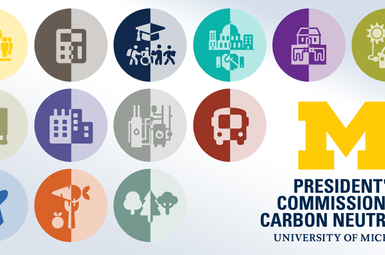
The President’s Commission on Carbon Neutrality at the University of Michigan has submitted its final report, which contains recommendations to help the university achieve net-zero greenhouse gas emissions. The report includes 50 recommendations that U-M could take to mitigate greenhouse gas emissions across the Ann Arbor, Dearborn and Flint campuses.

The Carbon Neutrality Acceleration Program at U-M’s Graham Sustainability Institute has awarded research grants to seven projects aimed at reducing net carbon emissions. The first round of funding was awarded to projects that investigate groundbreaking energy-storage and carbon-capture technologies, innovative ways to reduce carbon emissions in agriculture, and new options for lowering the carbon footprint of U-M student diets.
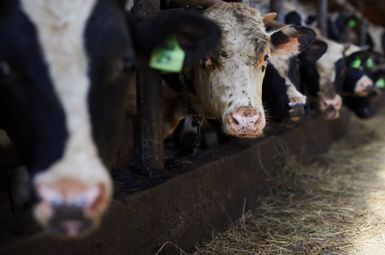
A study published by U-M researchers quantifies the air pollution that impacts Latinx communities in California due to beef production. The study focuses on Costco's beef supply chain in California and explores the environmental impacts of air pollution resulting from beef production in the San Joaquin Valley, a region that has some of the worst air quality in the United States.

Ajay Varadharajan (MS/MSE ’11) is the creator of GreenSwapp, the “first carbon-neutral grocery store app” that tracks the carbon footprint of the food items you buy, suggests lower-impact products that can reduce your cart’s footprint, and offsets the rest of it to make them carbon-neutral.
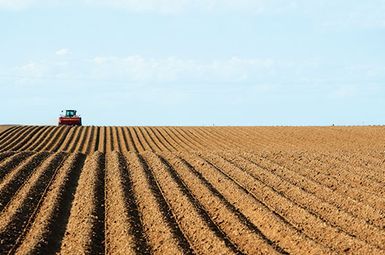
The health of our global food systems hangs in the balance of a changing climate. At the same time, these food networks also release a significant amount of carbon dioxide into the atmosphere, exacerbating our climate crisis. Current climate trends place unprecedented pressures on global food systems.
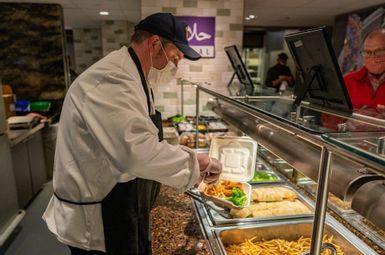
Typically, U-M dining halls offer reusable ware for on-site dining. But this semester, all meals will be served in takeout containers, and most of those containers will be fully compostable. These measures aim to reduce dining density while advancing the university’s commitment to composting
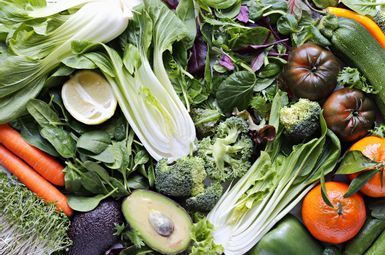
Replacing half of all animal-based foods in the U.S. diet with plant-based alternatives could reduce climate-altering greenhouse gas emissions 1.6 billion metric tons by 2030, according to a new study by researchers at U-M and Tulane University.
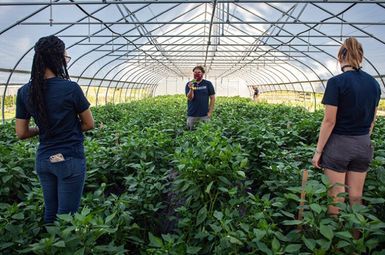
Part of the U-M President’s Commission on Carbon Neutrality, an analysis team of students and faculty is evaluating U-M’s food system, with an eye toward quantifying and reducing greenhouse gas emissions linked to food production, procurement and waste.
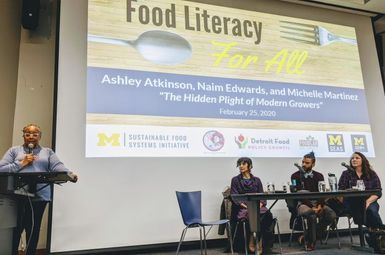
Detroit growers Jerry Hebron, Ashley Atkinson and Naim Edwards and environmental justice advocate Michelle Martinez discuss how climate change directly impacts urban agriculture and environmental issues in Detroit.
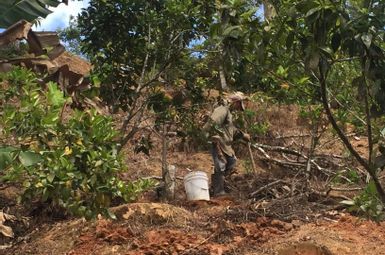
While most of the Puerto Rican coffee farms did lose a great deal of shade cover—an average of 37.5% canopy loss—there was “no relationship” between the amount of shade on a farm and damage to its coffee plants, U-M researchers report in a recent study.

U-M marine ecologist Jacob Allgeier uses artificial reefs, mathematical modeling and community-based conservation programs to understand how an unlikely but renewable source of fertilizer—fish excretion—can be used to stimulate fish production and improve food security in tropical ecosystems.
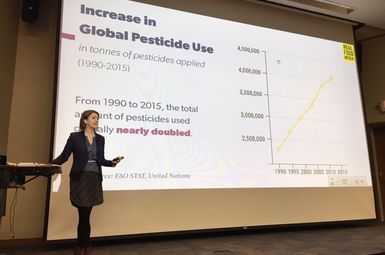
Author and activist Anna Lappé traces the many ripples of a way of farming that fights against nature and how communities around the country and the world are tapping natural wisdom to build abundant, just, diverse food systems and push back against corporate control.
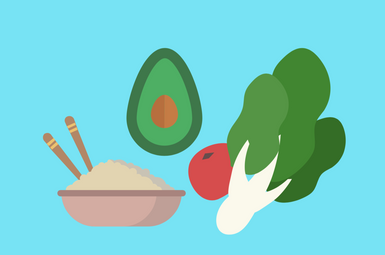
A new study examining the carbon footprint of what more than 16,000 Americans eat in a day has good news for environmentally conscious consumers: diets that are more climate-friendly are also healthier. The study, conducted by researchers at U-M and Tulane University, is the first to compare the climate impact and nutritional value of U.S. diets using real-world data about what Americans say they are eating.
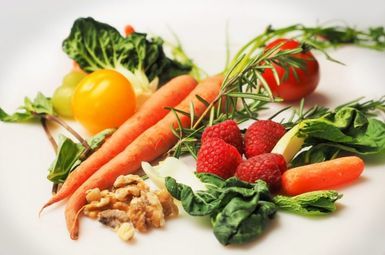
Human food systems are a key contributor to climate change and other environmental concerns. While the environmental impacts of diets have been evaluated at the aggregate level, few studies, and none for the US, have focused on individual self-selected diets. Such work is essential for estimating a distribution of impacts, which, in turn, is key to recommending policies for driving consumer demand towards lower environmental impacts.